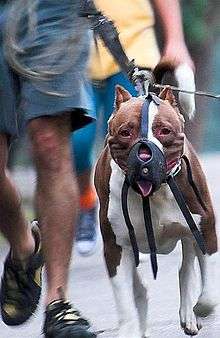Dangerous Dogs Act 1991
| Dangerous Dogs Act 1991 | |
|---|---|
 An American Pit Bull Terrier on a lead and wearing a muzzle | |
| Summary | |
| Makes it illegal to own any Specially Controlled Dogs without specific exemption from a court |
The Dangerous Dogs Act 1991 (c. 65) is an Act of the Parliament of the United Kingdom that was introduced in response to various incidents of serious injury or death resulting from attacks by aggressive and uncontrolled dogs, particularly on children. It has attracted criticism as an example of poorly-drafted legislation hastily enacted in response to a short-lived media storm.
The effect of the Act
Under the 1991 Act (and as amended in 1997) it is illegal to own any Specially Controlled Dogs without specific exemption from a court. The dogs have to be muzzled and kept on a lead in public, they must be registered and insured, neutered, tattooed and receive microchip implants. The Act also bans the breeding, sale and exchange of these dogs, even if they are on the Index of Exempted Dogs.[1]
Four types in particular were identified by the Act:
The Act also covers cross-breeds of the above four types of dog. Dangerous dogs are classified by "type", not by breed label. This means that whether a dog is prohibited under the Act will depend on a judgement about its physical characteristics, and whether they match the description of a prohibited "type". This assessment of the physical characteristics is made by a court.
The Act applies in England, Wales and Scotland,[2] with The Dangerous Dogs (Northern Ireland) Order 1991 having a similar effect in Northern Ireland.[3]
Index of Exempted Dogs
The Index of Exempted Dogs is maintained by the Animal Welfare section of the Department for Environment, Food and Rural Affairs, which administers the registration of specially-controlled dogs in England and Wales.
In 1991 and 1992 details of all Specially Controlled Dogs and their owners and keepers had to be added to the Index of Exempted Dogs. From early 1992 to 1997 no dogs were allowed to be added to the Index. In 1997 The Dangerous Dogs (Amendment) Act 1997 was passed which made some changes.
Case law
There have been several test cases of the Act, including Dempsey, a pit bull terrier which in 1995 was finally reprieved from a destruction order, to widespread media attention. The definition of the word "type" in the legislation was of particular controversy, as was the lack of discretion that the Act gives magistrates.
In the case of Sandhu v. Isleworth Crown Court, the defendant Sandhu was in prison and sought to nominate a temporary keeper to have his dog. The judicial review held that a person does have the right to nominate a person to temporarily keep the dog. This decision has more recently been more regulated to only allow for temporary keepership in certain circumstances.[4]
Criticism of the Act
The Act has been described as a piece of rushed legislation which was an overreaction to a transient public mood.[5][6] The Act is sometimes cited as an unfavourable example of such legislation,[7][8] and in January 2007 was included in public responses to a BBC Radio 4 poll of unpopular UK legislation.[9]
The Act has also been criticised as ineffectual because its mandate is limited to the four banned breeds; it has been suggested that the Act be amended to expand it remit to deal with dangerous dogs of any kind, irrespective of the breed.[10]
Comparable legislation elsewhere
Many other countries also have laws pertaining to dangerous dogs. These vary in severity. In some jurisdictions in Australia, dogs which have been declared dangerous are required to wear a collar of red and yellow stripes; under the legislation of some municipalities of Queensland, such dogs are seized and destroyed. In some local government areas restrictions are very carefully spelt out.[11]
See also
References
- ↑ "Types of dogs prohibited in Great Britain : Guidance on the recognition of prohibited dogs in Great Britain" (PDF). Defra. 2003. Archived from the original (PDF) on March 9, 2007. Retrieved 7 February 2013. via Internet Archive Wayback Machine
- ↑ Dangerous Dogs Act 1991 Short title, interpretation, commencement and extent, on the Statute Law Database
- ↑ The Dangerous Dogs (Northern Ireland) Order 1991, on the Statute Law Database
- ↑ http://lexisweb.co.uk/cases/2012/may/r-on-the-application-of-sandhu-v-isleworth-crown-court. Missing or empty
|title=(help) - ↑ "Dog control laws and pit bulls". BBC News. 2007-09-11. Retrieved 2010-04-30.
- ↑ "The Lords is the more democratic house". The Daily Telegraph. London. 2004-04-13. Retrieved 2010-04-30.
- ↑ fabians.org.uk
- ↑ Whatever happened to dangerous dogs?
- ↑ "Hunting ban tops 'unpopular' poll". BBC News. 2007-01-01. Retrieved 2010-04-30.
- ↑ "Dangerous Dogs Act has never worked - Andrew Rosindell MP". BBC. 20 August 2016. Retrieved 20 August 2016.
- ↑ Restricted Dog Breeds in Rockingham, Western Australia
External links
- DDA Watch - Organisation offering free advice and support to owners affected by the Dangerous Dogs Act. Campaigning for workable dog laws
- BBC Article on a dog attack - July 2005
- BBC Article on a dog attack - January 2007
- BBC Article "How do you fend off a dangerous dog?"
- BBC Article: Dangerous Dogs Act included in poll of unpopular laws
- Deed Not Breed: UK Campaign fighting the addition of any new breed to the DDA.
- Rover's Law - Megan's Law for Bad Dogs
- Information, Education, Advice & Support for dog owners in the UK, against breed specific legislation.
- Independent Article On Dog Attack June 2010.
UK Legislation
- Text of the Dangerous Dogs Act 1991 as in force today (including any amendments) within the United Kingdom, from legislation.gov.uk